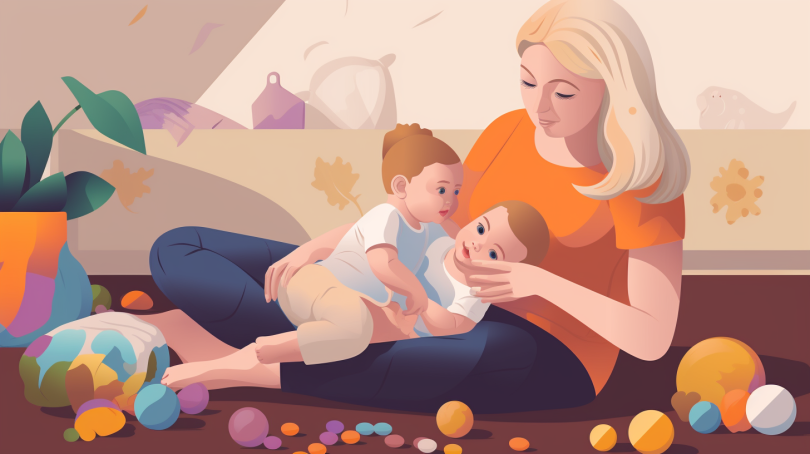Dealing with Criticism of Co-Sleeping: Tips and Strategies
Co-sleeping is a parenting practice where parents and their children share the same sleeping space. It has been a common practice in many cultures for centuries, and it has become increasingly popular in Western societies in recent years. However, despite its popularity, co-sleeping still receives criticism from some individuals who believe that it is an unsafe or inappropriate practice.
If you are a parent who practices co-sleeping or is considering it, you have probably faced criticism from family members, friends, or even strangers who disagree with your parenting choice. Criticism can be hurtful and make you question your decision to co-sleep. In this how-to guide/tutorial, we will provide you with tips and strategies on how to deal with criticism of co-sleeping. We will also address common concerns and misconceptions about co-sleeping and provide evidence-based information to support your decision.
Understanding Co-Sleeping
Before we dive into strategies on how to deal with criticism of co-sleeping, let’s first understand what co-sleeping is and its benefits and risks.
What is Co-Sleeping?
Co-sleeping refers to the practice of sleeping in the same room or bed as your child. There are three types of co-sleeping:
- Bed-sharing: This is when parents share the same bed with their child.
- Room-sharing: This is when parents and their child sleep in the same room but not in the same bed.
- Floor-bedding: This is when parents place a mattress on the floor next to their child’s crib or bed so they can easily attend to them during the night.
Co-sleeping has been a common practice in many cultures for centuries. In Western societies, it has gained popularity in recent years, particularly among parents who practice attachment parenting. Attachment parenting emphasizes the importance of nurturing and responding to a child’s needs, including their need for closeness and comfort during sleep.
The Benefits of Co-Sleeping
Co-sleeping has several benefits for both parents and children:
- It promotes bonding and attachment between parents and children.
- It helps regulate a child’s breathing, temperature, and heartbeat.
- It can make nighttime feedings or comforting easier for the parent.
- It can reduce a child’s risk of Sudden Infant Death Syndrome (SIDS) when practiced safely.
The Risks of Co-Sleeping
While co-sleeping has benefits, it also has potential risks that need to be considered:
- The risk of suffocation or accidental injury to the child if not practiced safely.
- The risk of disrupting a parent’s sleep, leading to exhaustion or sleep deprivation.
- The potential impact on a child’s independence and ability to self-soothe during sleep.
Dealing with Criticism of Co-Sleeping: Tips and Strategies
If you have faced criticism for co-sleeping, here are some tips and strategies that may help:
1. Educate Yourself
Educating yourself about the benefits and risks of co-sleeping can help you feel more confident in your decision. Read up on the latest research, talk to your healthcare provider or a sleep consultant, and join online support groups or forums to connect with other parents who practice co-sleeping. Having evidence-based information can help you respond to criticism with facts and confidence.
2. Communicate Your Decision
Communicating your decision to co-sleep with those who criticize you can help them understand your perspective. Explain why co-sleeping works for your family, the benefits you have experienced, and how you practice it safely. Encourage them to ask questions and share their concerns so that you can address them constructively.
3. Set Boundaries
If someone continues to criticize your decision after you have shared your perspective, it may be necessary to set boundaries. Let them know that while you appreciate their concern, you have made a decision that works for your family and will not tolerate further criticism or judgment.
4. Connect with Supportive People
Connecting with people who support your decision to co-sleep can help you feel less alone and more confident in your parenting choice. Seek out like-minded parents in person or online, join a local parenting group or attend a breastfeeding support group. Surrounding yourself with supportive people can make dealing with criticism easier.
5. Practice Self-Care
Criticism can take a toll on our mental health and well-being. It is essential to practice self-care when dealing with criticism of co-sleeping. Take time for yourself, engage in activities that bring you joy and relaxation, seek professional help if necessary, and remind yourself of the reasons why you chose to co-sleep despite criticism.
Addressing Common Concerns and Misconceptions About Co-Sleeping
In addition to dealing with criticism directly, it is also important to address common concerns and misconceptions about co-sleeping. Here are a few:
1. Co-Sleeping is Unsafe
Co-sleeping can be safe when practiced correctly. It is essential to follow safety guidelines, such as placing your child on their back to sleep, ensuring that there are no pillows or loose bedding around the child, and avoiding bed-sharing if you or your partner are under the influence of drugs or alcohol.
2. Co-Sleeping Leads to Separation Anxiety
Co-sleeping does not necessarily lead to separation anxiety. Separation anxiety is a natural part of a child’s development and can occur whether or not they co-sleep.
3. Co-Sleeping Prevents a Child from Learning Independence
Co-sleeping does not necessarily prevent a child from learning independence. Children develop independence at their own pace, and co-sleeping can provide a secure base for them to explore the world from.
In Conclusion
Criticism of co-sleeping can be hurtful and make parents question their decision. However, by educating yourself, communicating your decision, setting boundaries, connecting with supportive people, and practicing self-care, you can deal with criticism constructively. It is also important to address common concerns and misconceptions about co-sleeping with evidence-based information. Remember that every family is different, and what works for one may not work for another. Ultimately, the decision to co-sleep should be based on what works best for your family.




